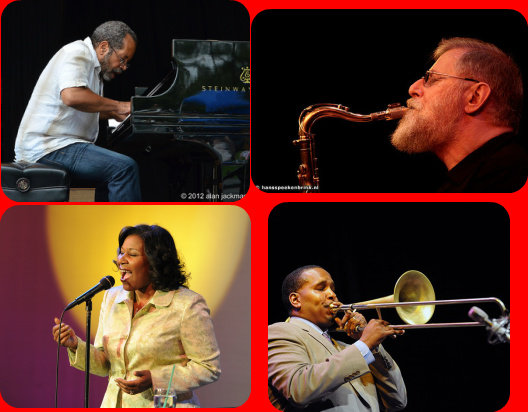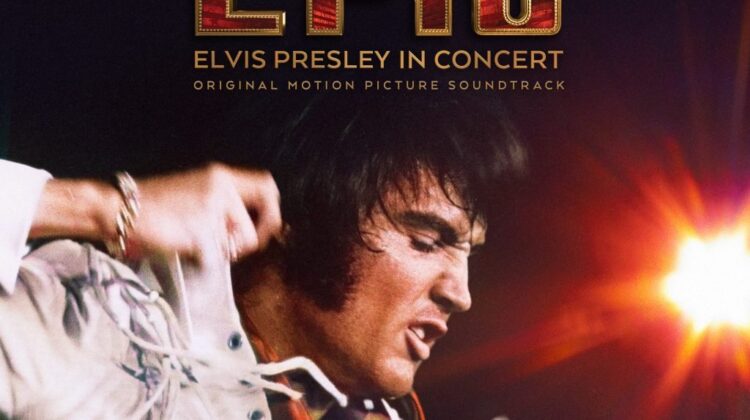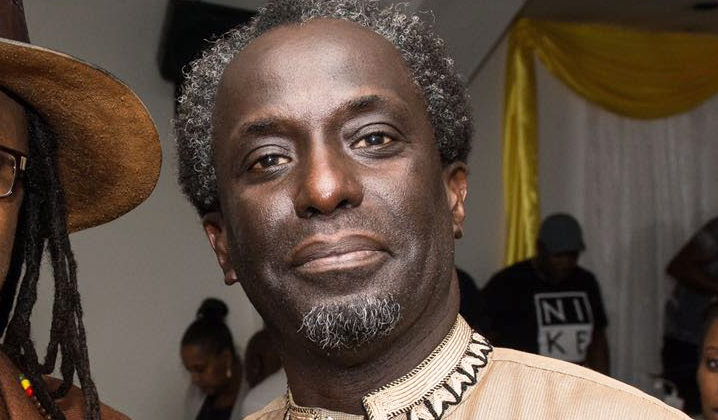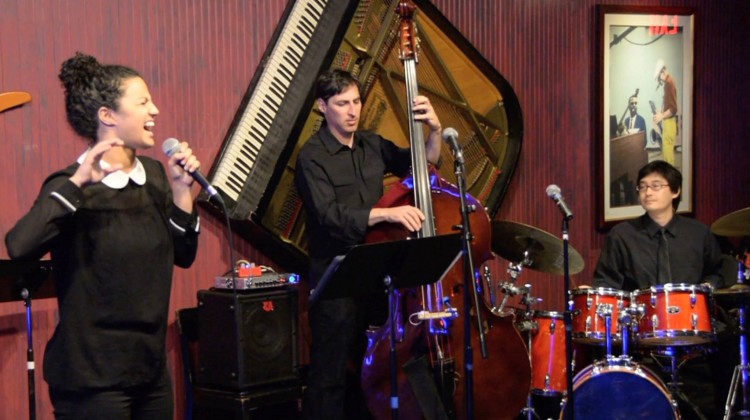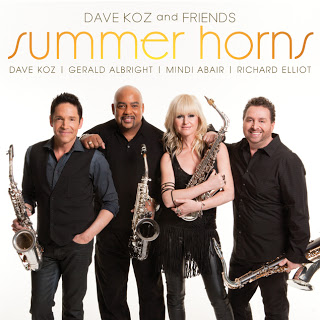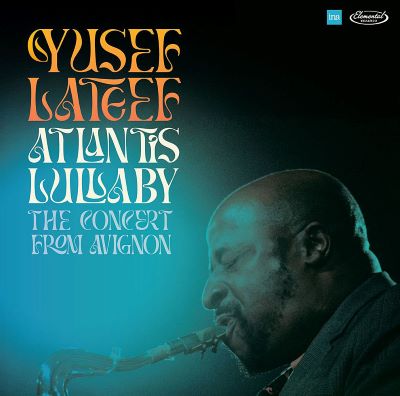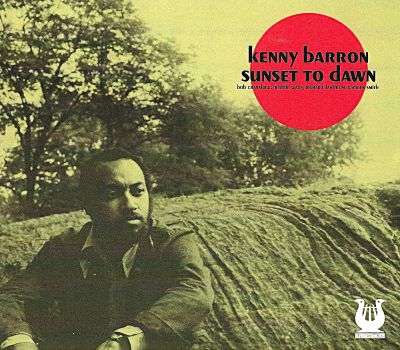In his early thirties, Yusef Lateef converted to Islam, changed his name from William Emanuel Huddleston, and began his studies of music without boundaries.
Dr. Lateef disliked the word “jazz” to describe his music because he believed that its connotations didn’t encompass the spiritual nature of music. He developed the term “autophysiopsychic music” instead.
Convinced that the cultural origins of musical instruments eventually coalesced into a single ethereal voice, Lateef considered them to be the physical means to attain music’s divine transcendence.
Lateef’s beliefs always involved the metaphysical and not the physical. His artistic endeavors expressing his beliefs expanded from music to literature and visual art, and he taught in universities and colleges until the end of his life in 2013.
Producer Zev Feldman continues without surcease to release important newly discovered recordings by jazz icons like Wes Montgomery or Bill Evans. It should be no surprise that Feldman features Lateef in yet another package of uncompromising quality. Feldman sought and found the appropriate recording that captures Lateef’s spirit. Serendipitously, his associates at Elemental Music notified Feldman that tapes of Lateef’s concert in Avignon, France existed in Paris’s Institut national de l’audiovisuel (INA).
That’s all Feldman needed to know.
Now the excitement of that concert is commercially available through Elemental Music.
Atlantis Lullaby: The Concert from Avignon is an extraordinary reminder of Lateef’s brilliance before a live audience and his individualistic influence upon succeeding generations of jazz musicians. The emphasis upon Lateef’s playing alone would make these recordings invaluable.
Percussionist Adam Rudolph, who spoke weekly with Lateef, writes, “Yusef was always coming up with new ideas, new concepts, new ways of doing things. He had his own voice on all the instruments he played. I think he was one of the first improvisers to start making his own instruments.”
On top of Lateef’s musical immersions into aspects of the soul, the accompanists in Lateef’s quartet—pianist Kenny Barron, bassist Bob Cunningham, and drummer Albert “Tootie” Heath—had internalized Lateef’s concepts. They had already developed a solid rapport as members of his touring band during previous concerts. Such were their mutual beliefs that all of the members of that quartet collaborated in 1973 (a year after the Avignon concert) on a philosophical book entitled Something Else, available from Lateef’s Autophysiopsychic Partnership publishing company.
Barron, always a fascinating, energetic musician, even unto today, understood. He writes in the package’s booklet, “It was okay to take a chance. You had permission to try things and see what would happen.” This extemporaneous spirit continues throughout Atlantis Lullaby: The Concert from Avignon. Indeed, Barron’s three compositions in the album (out of a total of six tracks) built the framework for a-moment-in-time improvisations, which developed as the spirit moved them.
Even as Lateef’s intellectual and spiritual endeavors multiplied throughout his career, the basis of his music, as he acknowledged, was the blues. His admiration of ground-breaking saxophonists like Lester Young and Ben Webster, who themselves had their own musical voices, is evident in Lateef’s saxophone work.
Their influences come through on Atlantis Lullaby.
“Yusef’s Mood,” from his 1957 recording with Hugh Lawson, entertained the audience as a rousing blues with an up-tempo shuffle that spreads his joy. Barron takes an uncharacteristic foot-stomper of a solo over 39…yes, 39…choruses. His unflagging energy—indeed, his thrilling build-up to Lateef’s eventual solo—showcases Barron’s adaptability to support any style that a group’s leader may choose. Barron’s remarkable technique was evident even in 1972 as he personalized the blues with his trademark cascades of notes, forceful accents, and subtly oblique re-harmonization. Lateef’s improvisations didn’t come in until Barron’s barrelhouse (one dare not call it “honky-tonk”) version ends at 11:10. That leaves only six minutes for Lateef to express his mood with exclamations, wavering notes, human-voice-like growling, and burly sonority. The same quartet played “Yusef’s Mood” again on Atlantic Records’s 1974 live album, Ten Years Hence.
Against the expectations set up by his reputation for free improvisation on sometimes unusual instruments, Lateef slowly plays on tenor sax “I’m Getting Sentimental Over You” with a similar depth of expression and with carefully cushioned crafting of tone, Lateef’s moving supplication constantly is evident in his spirited sincerity, especially when he improvises on to non-European scales. The rapport among the group results in a poignant and gorgeous interpretation, unlike anyone else’s.
When “I’m Getting Sentimental Over You” is compared to the modality of the opening track, Barron’s minor-key “Inside Atlantis,” one can appreciate the admirable versatility of all of the members of the quartet. Forceful and uninhibited, “Inside Atlantis,” over its 12-1/2 minutes, shifts moods from flowing rhythmless connective phrases to aggressive propulsion…as well as from the conventionality of the big-band standard. Barron once again develops one of his inimitable fleet solos anchored by plunging bass chords. In a blindfold test comparing the ballad to “Inside Atlantis,” Lateef may not be recognized as the same tenor saxophonist, so proficient is his talent in a wide range of genres.
The group’s unbridled vigor over the 25-3/4-minute performance of Barron’s “The Untitled” is similarly impressive. Each musician complements the other with separate but connected avenues of improvisation. After Barron drops out, at 1:50, Lateef seamlessly continues to play against solely the rhythm of bass and drums. And then, at 2:42, Lateef is back in a supporting role with long poignant tones as Cunningham takes the lead. At 3:20, Lateef provides contrast with a reverent section of calmness. Cunningham’s bows a sustained pedal point throughout Lateef’s invocation. Forceful rhythm then being inappropriate, Heath abandons the drums for a colloquy with Lateef on Indian flute. When Barron re-enters to elaborate upon Lateef’s worship, his style varies entirely from the excitement of the opening motive as it forms major-key prisms of beauty. The calmness comes before the storm, though, the result having moved from the very gradual return to a breakout of spirited free improvisation. A surprise awaits when, at 17:11, Barron, ever the virtuoso among a quartet of virtuosos, presents a scampering but ironically solemn solo without accompaniment. At 21:24, Cunningham comes into play against Barron’s continuing improvisation. A thunderous frenzy inspires Lateef’s vocal rejoicing. Heath drums mightily. After a pause, at 23:20, Barron introduces a prestissimo post-bop version of the theme to the audience’s appreciative applause. Finally, it becomes evident to the listener that “The Untitled” evolved spontaneously from an opening theme into an improvised suite.
Heath’s comparatively brief (at almost four minutes) “Lowland Lullaby” features the drummer, without rhythm, instead on Indian flute, joined solely by Cunningham’s atmospheric arco bass work. So proficient and affecting is Heath on the flute that one would think that Lateef is playing.
When Lateef plays on flute Barron’s “A Flower” as a duet with the pianist, Lateef reminds us of his explorative interest in world music at a time when there existed much less general interest in it. Lateef develops a moving, dulcetly toned, tranquil melody over Barron’s shimmering accompaniment, with nary a chord to be heard until the pianist’s own solo of Impressionistic sweep.
Sonny Rollins sums up Lateef’s importance in the booklet that accompanies the release: “I think his legacy is not just his music…, but we should also consider his whole legacy as a human being. He influenced me to be a better human being. I’m 93 years old and I’m still trying to be a person like Yusef.”
INA’s superb sound engineering of Atlantis Lullaby: The Concert from Avignon captures the sonic nuances of Lateef’s quartet from tapes recorded 52 years ago. The excellence of the performance and the iconic talent of the musicians endure.
If Atlantis Lullaby: The Concert from Avignon had been produced on vinyl in 1972, it would have been a major release.
In 2024, it’s still a major release on vinyl. And on CD.
Artist’s Web Site: https://yuseflateef.com/
Label’s Web Site: www.elemental-music.com


